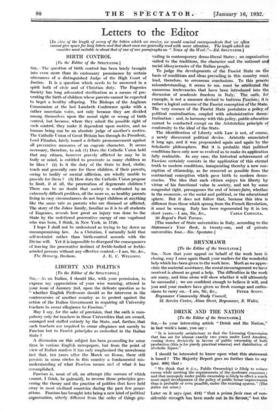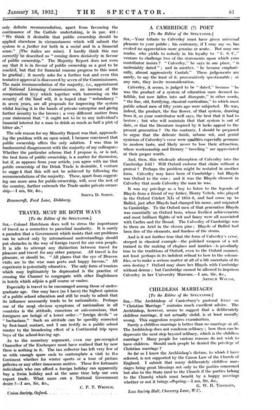DRINK AND TILE NATION-
[To the Editor of the SPECTATOR.]
Sut,—In your interesting article " Drink and the Nation,"
in, last- weeks issue; you say : . . - - " It is intensely satisfactory to find the Licensing Commiasion, that has sat for almost exactly two years, under Lord- Amulree,. coming down decisively in favour of public ovinership of both production (this is for purely practical reasons) and distribution of alcoholic liquor."
I should be interested to know-upon 'what this- statement
is based ? The Majority Report goes no further than to say (par. 408)- that :
" We think that it (i.e., Public Ownership) is likely to reduce excess while meeting the 'requirements of the moderate consumer ; and that monopoly under public ownership is likely to effect a much more rapid development of the policy of public, house improvement than is probable or even possible, under the existing systems." (The italics are mine.) Later on it says (par. 410) " that a prima jack ease of con- siderable strength has been made out in-its -favour," but the only definite recommendation, apart from favouring the continuance of the Carlisle undertaking, is in par.. 418: " We think it desirable that public ownership should be applied elsewhere in -circumstances which will submit the system to a further test both in a social and in a financial sense." (The italics are mine). I hardly think this can correctly'be described as " coming down decisively in favour of publie ownership." The Majority Report does not even say that it is in favour of public ownership as a goal to be reael4d, but that for financial reasons progress to this must be gradual ; it merely asks for a further test and even this tentative aPproval is disavowed by seven of the Commissioners. The main recommendation of the majority, i.e., appointment of Natiorial Licensing Commissioners, an increase of the compensation levy which together with borrowing on the security of the fund will, it is hoped clear " redundancy " in seven years, are all proposals for improving the system whilst leaving it in the hands of private enterprise and giving further security to the brewer ; a very different matter from your statement that " it ought not to be to any individual's financial interest for a man to drink as much as half a pint of bitter ale."
The sole reason for my Minority Report was that, approach- ing the problem with an open mind, I became convinced that public ownership offers the only solution. I was thus in fundamental disagreement with the majority of my colleagues.- Whether the particular scheme that I propose is, or is not, the best form of public ownership, is a matter for discussion, but if, as appears from your article, you agree with me that public ownership of the Drink Trade is desirable, I venture to suggest that this will not be achieved by following the recommendations of the majority. These, apart from suggest- ing one more area for public ownership, will, over the rest of the country, further entrench the Trade under private owner- ship.—I am, Sir, &c.,



































 Previous page
Previous page